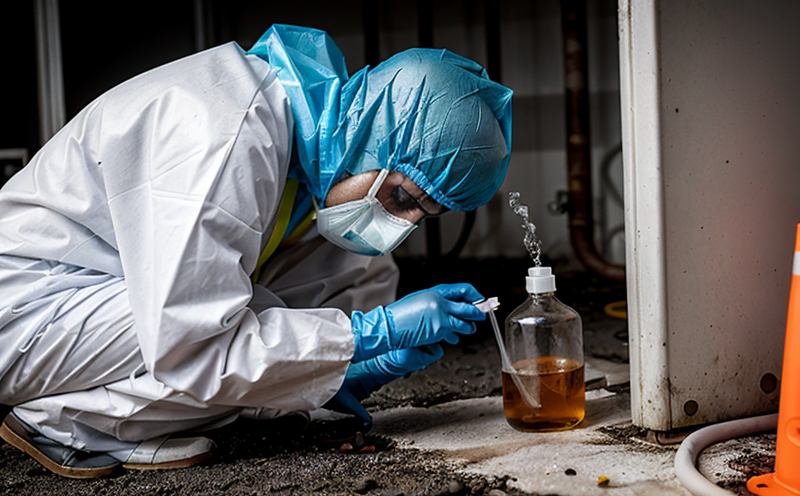ISO 15349 Sulfur Content Determination of Stainless Steels
The determination of sulfur content in stainless steels is critical for ensuring the mechanical properties and quality of materials used in various industries. ISO 15349 provides a standardized method to accurately measure sulfur content, which can vary depending on the type of stainless steel and its intended application.
Stainless steels are widely used across numerous sectors including automotive, aerospace, construction, and medical devices due to their corrosion resistance and durability. However, excess sulfur can lead to embrittlement or poor weldability, which is particularly undesirable in these high-performance applications. Therefore, precise control over the sulfur content ensures that stainless steel meets critical performance requirements.
The ISO 15349 method employs energy-dispersive X-ray fluorescence (EDXRF) spectroscopy for the analysis of sulfur and other trace elements. This technique is non-destructive and provides accurate results even in small sample sizes, making it ideal for quality control processes. The procedure involves dissolving a small portion of the stainless steel sample in a suitable acid solution before analysis.
Preparation of samples according to ISO 15349 requires careful handling to avoid contamination that could affect the accuracy of sulfur content determination. The process typically includes cleaning, drying, and weighing the sample accurately. Once prepared, the sample is placed into an appropriate vessel for dissolution in nitric acid followed by dilution with deionized water.
After dissolution, the solution undergoes a digestion step using perchloric acid to ensure complete breakdown of the matrix components. The final digestate is then analyzed using EDXRF equipment calibrated according to ISO 15349 guidelines. This method ensures repeatability and reliability across multiple samples and laboratories.
The precision and accuracy of this test are paramount, especially in industries where even minor variations in sulfur content can have significant implications on product performance or compliance with regulatory standards. By adhering strictly to the ISO 15349 protocol, labs can provide reliable data that supports informed decision-making regarding material selection.
The importance of accurate sulfur content measurement cannot be overstated when dealing with high-stress environments like those found in aerospace components or marine structures where corrosion resistance is essential. Ensuring compliance with international standards not only enhances product quality but also contributes to safer end products and reduced lifecycle costs through extended service life.
Accurate sulfur content determination supports various aspects of material characterization, including heat treatment processes, alloy composition analysis, and microstructural evaluation. Understanding the role of sulfur in stainless steel helps manufacturers optimize production techniques while maintaining stringent quality controls.
| Applied Standards | - ISO 15349:2018 - Determination of sulfur content in iron and non-ferrous metals using EDXRF | ||||
|---|---|---|---|---|---|
| Industry Applications | - Aerospace manufacturing | - Automotive component development | - Marine engineering projects | - Construction material evaluation | - Medical device fabrication |
With its stringent requirements and advanced analytical techniques, ISO 15349 ensures that stainless steel producers maintain consistent quality standards. This standard is particularly valuable in sectors where material integrity directly impacts safety and performance.
Applied Standards
| Standard | - ISO 15349:2018 - Determination of sulfur content in iron and non-ferrous metals using EDXRF |
|---|---|
| Description | This international standard specifies the procedure for determining the sulfur content in iron and non-ferrous metal matrices by energy-dispersive X-ray fluorescence (EDXRF) spectroscopy. |
ISO 15349 ensures that laboratories follow a consistent methodology when analyzing sulfur levels, thereby enhancing the reliability of test results. The standard covers sample preparation, calibration procedures, data interpretation, and reporting requirements. Compliance with this standard guarantees that sulfur content measurements are accurate, repeatable, and comparable between different testing facilities.
The application of ISO 15349 in stainless steel analysis is crucial for ensuring product quality across various industries. By adhering to these stringent guidelines, laboratories can provide reliable data supporting informed decisions about material selection and process optimization.
Industry Applications
- Aerospace manufacturing: Ensuring the integrity of critical components like turbine blades and landing gear.
- Automotive component development: Optimizing alloy compositions for improved performance and durability.
- Marine engineering projects: Evaluating corrosion resistance in ship hulls and other structural elements.
- Construction material evaluation: Assessing quality control measures during concrete mix design.
- Medical device fabrication: Guaranteeing the safety and efficacy of implants made from stainless steel.
In each of these industries, precise sulfur content determination plays a vital role in meeting regulatory requirements and ensuring product performance. By leveraging ISO 15349, manufacturers can enhance their competitive advantage by delivering higher quality products that meet stringent standards.
Eurolab Advantages
EuroLab offers comprehensive testing services tailored to the specific needs of the additive manufacturing and 3D printing industry. Our expertise in chemical and contamination testing ensures accurate sulfur content determination according to ISO 15349.
- State-of-the-art EDXRF equipment for precise measurement.
- Certified analysts with extensive experience in metals analysis.
- Prompt turnaround times for timely results delivery.
- Detailed reports highlighting compliance with relevant standards and specifications.
- Comprehensive quality control measures to safeguard data integrity throughout the testing process.
Our commitment to excellence has earned us a reputation as a trusted partner for industries demanding reliable, accurate sulfur content analysis. With EuroLab's services, you can rest assured that your materials meet the highest standards of quality and safety.





